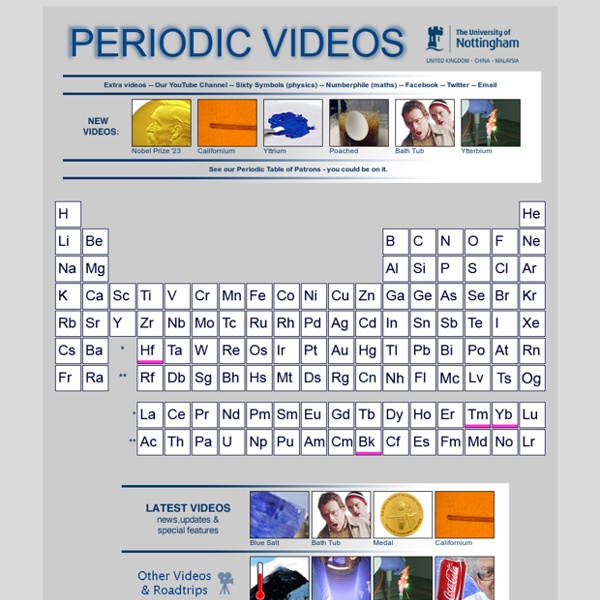15 Ideas for Using Digital Cameras in Science
1. Stop motion movies and flip books. By taking multiple pictures, students would create a photo flip book or stop motion movie to demonstrate, as accurately as possible, a particular science concept or process.
Chemistry games and puzzles
Science Games Who Wants to Win $1,000,000? - Answer 15 science and math based questions correctly and become a (pretend!)
Flinn NSTA 2010
Workshop Handouts and videos Morning of Chemistry Handout Morning of Chemistry Videos See the Products on Display in Our Booth
ARKive - Discover the world's most endangered species
Wildscreen's Arkive project was launched in 2003 and grew to become the world's biggest encyclopaedia of life on Earth. With the help of over 7,000 of the world’s best wildlife filmmakers and photographers, conservationists and scientists, Arkive.org featured multi-media fact-files for more than 16,000 endangered species. Freely accessible to everyone, over half a million people every month, from over 200 countries, used Arkive to learn and discover the wonders of the natural world. Since 2013 Wildscreen was unable to raise sufficient funds from trusts, foundations, corporates and individual donors to support the year-round costs of keeping Arkive online. Therefore, the charity had been using its reserves to keep the project online and was unable to fund any dedicated staff to maintain Arkive, let alone future-proof it, for over half a decade. Despite appeals for support, just 85 of our 5.6 million users in 2018 made a donation.
Origin of the Periodic Table
I know what the periodic table looks like, but where did it come from? Whose idea was it to arrange the elements this way? He set them out in order of atomic weight, and then grouped them into rows and columns based on their chemical and physical properties. 1869...that's way before the Schrödinger model, or even the Rutherford model. That's right. Mendeleev had no idea what atoms were made of or why they behaved as they did.
50 Really Cool Online Tools for Science Teachers
A 21st-century education revolves around the Internet for everything from collaboration, tools, lessons, and even earning degrees online. If you are looking for ways to integrate online learning into your science class or science degree programs, then take a look at these cool online tools that are just perfect for both teachers and students. Science Tools to Use with Students These tools offer opportunities for learning about climate, cells, the human body, nature, and more. ChemiCool. Share this periodic table with your class for an easy to use tool with information on each of the specific elements.GPS Activities and Lesson Plans.
The World of Chemistry
1. The World of Chemistry The relationships of chemistry to the other sciences and to everyday life are presented. 2.
100 Incredible Lectures from the World’s Top Scientists
Posted on Thursday June 18, 2009 by Staff Writers By Sarah Russel Unless you’re enrolled at one of the best online colleges or are an elite member of the science and engineering inner circle, you’re probably left out of most of the exciting research explored by the world’s greatest scientists. But thanks to the Internet and the generosity of many universities and online colleges, you’ve now got access to the cutting edge theories and projects that are changing the world in this list below. If you’re looking for even more amazing lectures, check out our updated list for 2012 with more talks from great minds.



